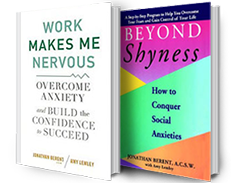View/Download Complete PDF of this Ebook
“Is everything okay?”
When you really analyze it, can you think of a more meaningless question? People ask this all the time. What do you say? Do you tell the truth, or just toss off something like “fine”? Sometimes, I respond to this question with “If it wasn’t, would you really want to know?” The greeting itself characterizes the very often superficial level of “niceties” involved with conversation. Small talk has its place—though most people will admit they don’t enjoy it. For people with conversation anxiety, however, it can be excruciating. How much is too much to say? What should you ask in response? What if you don’t know what to say? What if you sound stupid? What if you’re not perfect?
These pressures tempt many people to avoid small talk altogether. But small talk matters—therefore, controlling the anxiety you have surrounding it is critical. Learning the simple social skill of cordial interaction My coauthor, Amy Lemley, and I recognize the value of small talk to our own work together. If I hadn’t had a spontaneous conversation on a basketball court in 1990 with a fellow player who happened to be a writer, who had a girlfriend (Amy) who was also a writer, we never would have begun working together and I never would have been involved in the networking process that led to my finding a literary agent. That would have really sucked! When I “explored” this conversation on the basketball court I was in my “Natural Child” mind state—a concept we will address later.
Recently I attended a wedding. It was in June. I was not looking forward to this because it took me away from my summer routine and had an impact on an entire weekend. Plus, it’s usually difficult to have any stimulating conversation at these events, and the loud music inhibits
There were about 250 people attending. I only knew the parents of the groom and my wife. During the cocktail hour, I said to my wife, “Can you imagine being here by yourself; who would you talk to?” Actually, she’s very social and would have no problem.
At the table where we were sitting I initiated a conversation with a man who held both an MD and a PHD. He was a well known psychopharmacologist. I was getting his “take” on everything from marijuana to SSRIs. While I disagreed with many of his beliefs, it was a stimulating conversation. It was rewarding. It was worth plowing through the small talk so we could move beyond it and really enjoy talking and connecting with one another.
I can’t begin to tell you how many times I have tried to initiate conversation, or have been involved in conversation, that is absurd, ridiculous, asinine, negative, or where my conversation partner was in a different dimension from me, or just an asshole. I’ve had so many conversations in so many venues where I thought the person was weird because of the abruptness with which the conversation did not develop or ended. While I may not want to invest social time where this type socializing, I do not fear it or take it personally because my conversation skills are intact.
If you experience conversation anxiety and want to get better at controlling it you need to practice. This fact is common sense. Logic and objectivity will tell you that diligent practice is necessary for any skills development. Your logic and objectivity is energy from your “adult” mind state. This state is your internal “computer.” If you do not practice because of your concern with “perfectionism” be clear that “perfectionism” is a sign of insecurity. What you need to invest in is a pursuit of excellence; a process and psychology that allows you to create a productive learning curve in general and specifically the ability to learn from mistakes!
But practicing alone is not enough. You need to balance your “mind states” as you practice. Anxiety is a disorder—but it is not a permanent flaw. Anxiety can be cured. Your fear can be managed. Your life can be changed. And you will be the one to change it.
This e-book will introduce you to the basic process for healing your conversation anxiety You will learn what conversation anxiety is, you will establish the extent to which is affecting your life, and you will understand the physical and mental processes at work. You will also gain an understanding of a concept called Mind States Balance, which offers a method for reframing situations by adjusting your own interpretations of them. You can then follow up with comprehensive developmental training via our new book, Work Makes Me Nervous: Overcome Anxiety and Develop the Confidence to Succeed (John Wiley & Sons, 2010), available via booksellers such as www.barnesandnoble.com and www.amazon.com.
Self-Censorship = Selective Mutism
Now I want you to think about something very carefully. Take a long, slow, deep breath in and exhale slowly first. Identify a situation where you were in a social or interactive possibility and you wanted to say something or felt that you should have said something, but did not. When you make a decision not to, you are in essence censoring yourself. This may be because you did not want to experience embarrassment or humiliation. It may be because you worry about how you will be perceived or because of your concern that what you say has to be “just right” or “perfect.” The reality is that the censoring is the result of your internal critical script. It says, “Don’t talk” and “Don’t take the risk.”



